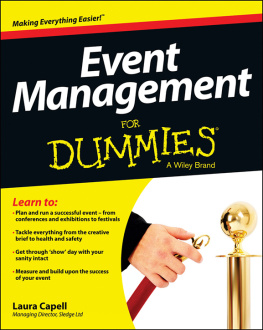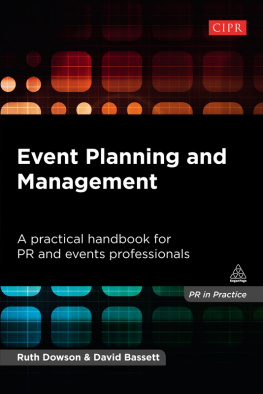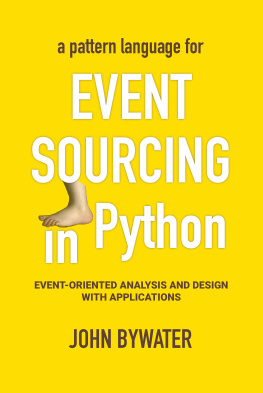Title Page
The Guide to Event Management
A Guide to Setting Up, Planning and Managing an Event Successfully
By
Rus Slater
Publisher Information
The Guide to Event Management published in 2012 by
Andrews UK Limited
www.andrewsuk.com
This book is sold subject to the condition that it shall not, by way of trade or otherwise, be lent, resold, hired out or otherwise circulated without the publishers prior written consent in any form of binding or cover other than that in which it is published, and without a similar condition being imposed on the subsequent purchaser.
The characters and situations in this book are entirely imaginary and bear no relation to any real person or actual happening.
Copyright Rus Slater
The right of Rus Slater to be identified as author of this book has been asserted in accordance with section 77 and 78 of the Copyrights Designs and Patents Act 1988.
The Guide to Event Management
Event Management
In the course of the year, it is likely that any organisation will want to manage a range of different events, varying from some that are small, straightforward, internal and informal to others that are logistically complex, multi-departmental, public and with high visibility.
Examples might include
- A farewell dinner for a long serving staff member
- A product launch party
- A company conference
- A team away day for teambuilding or strategy development
- A company supported charity event
- An open day or school/college visit
- A Christmas party
- A street party
- A stand at a trade show
- An industry conference initiated by your company
You might also be looking to arrange a wedding or anniversary party in the family; this guide is just as useful for people in a non work environment.
This guide aims to help you to do it efficiently.
It was originally written for the purposes of a charity but has been developed for more general use. The author, Rus Slater, has many years of experience of planning and managing events, ranging from theatrical productions, such as elements of the now defunct Royal Tournament, to Fundraising Balls, company conferences and team offsites.
Introduction
If you have volunteered, or been selected, to manage an event, you will want to make sure that it goes ahead to the satisfaction of all and with the minimum amount of difficulty. To get these results will require a considerable degree of planning and managing from you and in turn you will need to get the support of others.
This guide is designed to help you to set out to run the event in a comprehensive way, so that you have the minimum amount of crisis management, fire fighting and stress! To help you to make a success of your event, we provide
- A checklist to support the selection and shaping of each event and help you to understand how to assess and manage risks
- A methodology for planning and logistics that
- Is logical and comprehensive
- Can be picked up by, or explained to, another person - for example, hotel banqueting manager or anyone helping.
This guide aims to help you to ensure that you
- Know what you want to achieve before you start
- Cover all the bases in good time
- Plan the work that needs to be done in order to make your event a success
- Manage the plan effectively to reduce stress, errors and disaster
- Evaluate the success of the event in order to benefit the organisation, your team and your own career where appropriate
Project Management and Events
Planning and managing an event can be deemed to be a project with a specific end goal and time frame. Unfortunately, as a generic subject, project management has tended to be used for monster projects of the type initiated by governments and global corporations. It has also tended to be placed in the realm of the IT world, where many of these projects exist. Consequently, a lot of project management training, books and material is aimed at these multi-million-pound, several-year projects and is too cumbersome for even quite complex events.
This guide aims to take the fundamentals from best-practice project management method and make it user friendly for more everyday use.
This guide also contains tried and tested information to help with the selection, assessment and planning of events, which wouldnt be found in any project management material.
It has been designed to support people who
- Havent managed an event (or been trained to manage one) before and are about to take on that responsibility
- Arent going to be a full-time event manager, but will have to manage them from time to time
- Have been selected to manage a specific, one-off event and want to get it right first time, even though they may never have managed an event before.
Organise Your Thoughts...
There are many different aspects involved in managing an event, not all of which may apply to you. It is critical, even for a small event, that you organise your thoughts and tackle things in a logical sequence. This will greatly enhance your chances of success and the plaudits you will receive when the event goes smoothly and achieves its aims.
You will need to think about things in the following order:
1. Before I start- is this an event?
2. Do research to gather information and options in areas such as
- Partners
- Theme
- Venue
- Date
- Catering
- Facilities
- Travel and transport
- Entertainment
- Publicity
- Car parking
- Security
- Competitors
- Insurance and legal issues
- Pricing
- Risk and Health & Safety assessments
- Staffing and manpower required
- Funding
- Income management
3. Define the event objective
- Do you have an appropriate objective?
- Is there more than one objective?
4. Get people in place
- Who has initiated the project
- Who is going to champion it at higher levels?
- Who accepts or rejects the end result?
5. Create event or project team
6. Develop the Event Initiation Document
7. Assess any risks
- What factors could jeopardise the success of the vent?
8. Create a Task List
- What tasks need to be completed?
- Who does them?
- What resources are needed?
- How long will each take?
- What dependencies are there between tasks?
9. Schedule the Tasks
- Can we avoid resource clashes?
- Can we identify potential bottlenecks?
10. Deliver
- Motivate those involved
- Check progress against the plan
- Manage the inevitable changes to the plan
- Keep communicating
- Recognise and appreciate the people involved
11. Evaluate the event and celebrate your success
12. Learn from what transpired
The list above is now covered in a degree more detail.......
Before You Start
There are some important matters to get straight before you start the process of planning and managing an event.
Though some of these points may seem, initially, to be no-brainers, they are all issues that have caused events to go disastrously awry.
1. Is This Actually an Event?
- An event is a one-time endeavour, undertaken to create a unique outcome.
- An event is unique; it is not an ongoing activity. An event produces a result that is different from business as usual.
- An event has a finishing date (date rather than result).
For example, suppose you work for an estate agency who are marketing a new, exclusive development of luxury homes; The initial open day, when the first show house is opened with razzamatazz, is an event; the period thereafter, when the bulk of the homes will be sold, is part of business as usual.
Next page






